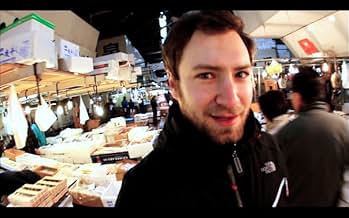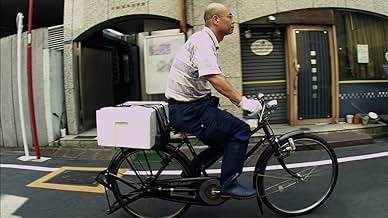IMDb-BEWERTUNG
7,8/10
39.157
IHRE BEWERTUNG
Ein Dokumentarfilm über den 85-jährigen Sushi-Meister Jiro Ono, sein renommiertes Tokioter Restaurant und seine Beziehung zu seinem Sohn und.Ein Dokumentarfilm über den 85-jährigen Sushi-Meister Jiro Ono, sein renommiertes Tokioter Restaurant und seine Beziehung zu seinem Sohn und.Ein Dokumentarfilm über den 85-jährigen Sushi-Meister Jiro Ono, sein renommiertes Tokioter Restaurant und seine Beziehung zu seinem Sohn und.
- Auszeichnungen
- 3 Gewinne & 12 Nominierungen insgesamt
Takashi Ono
- Self
- (Nicht genannt)
Empfohlene Bewertungen
Sushi lovers will be hypnotized by the 85 year old subject of the documentary Jiro Dreams of Sushi. Jiro has spent his life seeking perfection in sushi preparation, and Michelin agrees that he has come close by awarding him three stars, unprecedented for an octogenarian.
Jiro's restaurant Sukiyabashi Jiro in a Tokyo office building basement has reservations available a month away. He and his heir, Yoshikazu labor all day to buy the best raw fish at the market and sell the best sushi. Nothing less.
The film does a good job tracking the preparation, from picking one out of ten fish at any time to delicately shaping tuna around rice or massaging octopi for 20 minutes before preparation. Buying the best rice is another ritual that has its own rules, and Jiro rules.
Although the documentary can be repetitious, moments of beauty accompany the process such as likening serving sushi to a concert with different moods and tempos.
It might be best to see this film on a full stomach. Otherwise you'll be racing to the nearest Asian bistro. Not a bad thing.
Jiro's restaurant Sukiyabashi Jiro in a Tokyo office building basement has reservations available a month away. He and his heir, Yoshikazu labor all day to buy the best raw fish at the market and sell the best sushi. Nothing less.
The film does a good job tracking the preparation, from picking one out of ten fish at any time to delicately shaping tuna around rice or massaging octopi for 20 minutes before preparation. Buying the best rice is another ritual that has its own rules, and Jiro rules.
Although the documentary can be repetitious, moments of beauty accompany the process such as likening serving sushi to a concert with different moods and tempos.
It might be best to see this film on a full stomach. Otherwise you'll be racing to the nearest Asian bistro. Not a bad thing.
There are no spoilers in this review simply because there is nothing in "Jiro Dreams of Sushi" to spoil. There is no plot as such. It is strictly a portrait of Jiro Ono, the world's greatest sushi-maker. He has no hobbies or interests other than sushi. The only major change in his life in the last 40 years is that he quit smoking. He groomed both his now middle-aged sons (somewhat against their will) to be sushi chefs.
The point of the film seems to be two-fold. The main purpose seems to be to assure Jiro's legions of fans that his elder son Yoshikazu will follow his father's recipes exactingly and will make no changes to the restaurant once Jiro dies. And the secondary purpose is to show the importance of sustainable fishing.
If you're looking for a narrative plot-driven film, you'll be disappointed. But if you are a foodie who likes seeing behind the scenes at a fine restaurant, this is the movie for you. Be warned though: You have to see this in a theater near a sushi restaurant or you'll be disappointed in whatever meal you eat following the film.
The point of the film seems to be two-fold. The main purpose seems to be to assure Jiro's legions of fans that his elder son Yoshikazu will follow his father's recipes exactingly and will make no changes to the restaurant once Jiro dies. And the secondary purpose is to show the importance of sustainable fishing.
If you're looking for a narrative plot-driven film, you'll be disappointed. But if you are a foodie who likes seeing behind the scenes at a fine restaurant, this is the movie for you. Be warned though: You have to see this in a theater near a sushi restaurant or you'll be disappointed in whatever meal you eat following the film.
Located in a downtown Tokyo subway station, Sukiyabashi Jiro is an inconspicuous subterranean restaurant with just ten counter seats, yet it has the distinction of being the only sushi restaurant with a three-star Michelin rating. David Gelb's meticulously produced 2012 documentary tells the story of Jiro Ono, an octogenarian perfectionist whose constant striving for culinary transcendence has made him legendary among epicureans in the know. He loves his job, as he readily admits upfront, and while a model of stoic diligence and invariable routine, Ono does show his adoration in unexpected ways that manifest themselves through the unassuming pride he takes in his work. He even imagines new sushi creations in his sleep, thus the title. Such an unwavering quest does take its toll on his two sons who must find their way out of his shadow.
His younger son Takashi managed to escape the constant glare of his father by running his own premium sushi restaurant in the Roppongi Hills area of Tokyo, one that doesn't bother to compete with his father's. His older son Yoshikazu, however, bears the burden of the family legacy as the one to carry on his father's standards after he retires. Over fifty and still an apprentice, Yoshikazu patiently waits for his turn at running the flagship restaurant foregoing earlier dreams of becoming a race car driver. Since his father suffered a heart attack at seventy, he has taken over the critical task of getting the best fish possible at the world-renowned Tsukiji fish market. Gelb does a particularly nice job of showing the hurly-burly atmosphere of the pre-dawn tuna auctions and the lives of the men running the tiny stalls selling fresh seafood of all kinds. Perhaps by design, the film is comparatively more opaque in having us understand the genesis of the elder Ono's drive toward perfection.
While one contributing factor was the absence of Ono's father's absence, it is unclear who actually did influence him to become a sushi chef. There is also hardly a mention of the chef's wife, even though there is an extended passage of a reunion with his childhood pals who characterize him as something of a bully. Interviews with former co-workers shed some light onto the chef's stoicism. In fact, one of Japan's better known food critics admits to being intimidated by patronizing Ono's sushi bar due to the master's overwhelming artistry and attention to detail. Toward that end, I would have liked to have seen more scenes focused on the actual preparation of the sushi rather than simply admiring them on the counter once they are finished. Still, this is a unique look into a man who has not gone gentle into the good night in his quest for the perfect piece of sushi.
His younger son Takashi managed to escape the constant glare of his father by running his own premium sushi restaurant in the Roppongi Hills area of Tokyo, one that doesn't bother to compete with his father's. His older son Yoshikazu, however, bears the burden of the family legacy as the one to carry on his father's standards after he retires. Over fifty and still an apprentice, Yoshikazu patiently waits for his turn at running the flagship restaurant foregoing earlier dreams of becoming a race car driver. Since his father suffered a heart attack at seventy, he has taken over the critical task of getting the best fish possible at the world-renowned Tsukiji fish market. Gelb does a particularly nice job of showing the hurly-burly atmosphere of the pre-dawn tuna auctions and the lives of the men running the tiny stalls selling fresh seafood of all kinds. Perhaps by design, the film is comparatively more opaque in having us understand the genesis of the elder Ono's drive toward perfection.
While one contributing factor was the absence of Ono's father's absence, it is unclear who actually did influence him to become a sushi chef. There is also hardly a mention of the chef's wife, even though there is an extended passage of a reunion with his childhood pals who characterize him as something of a bully. Interviews with former co-workers shed some light onto the chef's stoicism. In fact, one of Japan's better known food critics admits to being intimidated by patronizing Ono's sushi bar due to the master's overwhelming artistry and attention to detail. Toward that end, I would have liked to have seen more scenes focused on the actual preparation of the sushi rather than simply admiring them on the counter once they are finished. Still, this is a unique look into a man who has not gone gentle into the good night in his quest for the perfect piece of sushi.
This is a movie about food, but it's much deeper in its story and content. I was truly inspired by a man's pursuit of perfection, the dedications of the understudies, the family dynamic between father and son, and the cultural beauty of Japanese crafts. Yes there are shots of "food porn" woven in, but the movie is charming and much deeper than slow-motion food shots (not that I'm complaining, some shots are stunning).
The young director has good command of the camera, and drives the movie through interviews. People in the theater were applauding at the end. I can't wait to get the DVD.
The young director has good command of the camera, and drives the movie through interviews. People in the theater were applauding at the end. I can't wait to get the DVD.
A lingering, sentimental look at the mentality and habits of Jiro Ono, legendary sushi chef and Japanese national treasure. The long, personal chats with Jiro and sons, plus an exhaustive investigation into every aspect of his business, are balanced by an overly generous dose of shallow focal-range, slow-motion food porn. Like many stereotypical wise men of his age and nationality, the old master also has plenty of sharp, stirring wisdom to impart. Though he doesn't come right out and say it, it's easy to see the parallels he hopes you'll draw between his dedication to the kitchen and the nuances of a rewarding life, and my breath caught in my throat on more than one occasion. A great vehicle for deep immersion into a very traditional Japanese culture, this is far deeper and more rewarding than it initially lets on.
Wusstest du schon
- WissenswertesIdeally, the components of sushi should be served at two different temperatures. The rice should be body temperature for best rolling and pressing qualities, and the topping (usually fish) should be room temperature for best flavor. The apprentice preparing the rice places it in an insulated container to keep it at the correct temperature.
- Crazy CreditsIn the Special Thanks section, "The Tsukiji Fish Market" is listed twice.
- VerbindungenEdited into Independent Lens: Jiro Dreams of Sushi (2013)
- SoundtracksConcerto for Violin and Orchestra In D, Opus #5: I, Allegro Moderato, Cadenza
Written by Pyotr Ilyich Tchaikovsky
Performed by Jascha Heifetz, London Philharmonic Orchestra and John Barbirolli
Top-Auswahl
Melde dich zum Bewerten an und greife auf die Watchlist für personalisierte Empfehlungen zu.
- How long is Jiro Dreams of Sushi?Powered by Alexa
Details
- Erscheinungsdatum
- Herkunftsland
- Offizielle Standorte
- Sprache
- Auch bekannt als
- Jiro Dreams of Sushi
- Drehorte
- Produktionsfirmen
- Weitere beteiligte Unternehmen bei IMDbPro anzeigen
Box Office
- Bruttoertrag in den USA und Kanada
- 2.552.478 $
- Eröffnungswochenende in den USA und in Kanada
- 42.035 $
- 11. März 2012
- Weltweiter Bruttoertrag
- 2.692.864 $
- Laufzeit
- 1 Std. 21 Min.(81 min)
- Farbe
- Sound-Mix
- Seitenverhältnis
- 1.78 : 1
Zu dieser Seite beitragen
Bearbeitung vorschlagen oder fehlenden Inhalt hinzufügen








